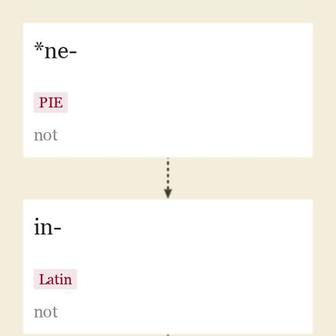intolerable (adj.)
intolerabilis(不可忍受的)一词源于14世纪晚期的拉丁语,由 in-(不,相反)和 tolerabilis(可忍受的)组成,其中 tolerabilis 源于 tolerare(忍受,容忍),参见 in-(1)和 toleration。相关词汇: Intolerably(难以忍受地)。
intolerable 的相关词汇

这个词缀的意思是“不,相反,没有”(也可以是通过与后面的辅音音节化的 -n- 的同化而来的 im-, il-, ir-,这种趋势始于后期拉丁语),源自拉丁语 in- “不”,与希腊语 an-,古英语 un- 同源,均来自 PIE 词根 *ne- “不”。
在古法语和中古英语中,通常使用 en-,但大多数这些形式在现代英语中已经不再使用,只有极少数(例如 enemy)不再被视为否定的。在英语中的经验法则是,对于明显的拉丁语元素使用 in-,对于本土或本土化的元素使用 un-。
1510年代,“由权威授予的许可证,执照”,源自15世纪的法语 tolération,源自拉丁语 tolerationem(主格 toleratio)“承受,支持,忍受”,动名词形式,来自 tolerare 的过去分词词干“忍受,支持,承受”,字面意思是“承受”(来自 PIE *tele- “承受,携带”; 参见 extol)。
“容忍,忍耐”之意始于1580年代。特定的宗教意义始于1609年; 如 Act of Toleration(1689),是英国给予异议派新教徒宗教崇拜自由(附带条件)的法令。在这里,它的意思是“承认在信仰和崇拜事项上拥有私人判断权; 政府授予的自由宣讲和崇拜的权利; 在法律上平等,不考虑宗教信仰。”
If any man err from the right way, it is his own misfortune, no injury to thee; nor therefore art thou to punish him in the things of this life because thou supposest he will be miserable in that which is to come. Nobody, therefore, in fine, neither single persons nor churches, nay, nor even commonwealths, have any just title to invade the civil rights and worldly goods of each other upon pretence of religion. [John Locke, "Letter Concerning Toleration," 1689]
“如果有人偏离了正确的道路,那是他自己的不幸,对你没有伤害; 因此,你不应该因为你认为他将在未来受苦而在这个生活中惩罚他。因此,总之,无论是个人还是教会,甚至是国家,都没有任何正当理由在宗教的借口下侵犯彼此的公民权利和世俗财产。”[约翰·洛克,“论容忍的信件”,1689年]
Before any man can be considered as a member of Civil Society, he must be considered as a subject of the Governour of the Universe: And if a member of Civil Society, do it with a saving of his allegiance to the Universal Sovereign. We maintain therefore that in matters of Religion, no man's right is abridged by the institution of Civil Society and that Religion is wholly exempt from its cognizance. [James Madison, "Memorial and Remonstrance Against Religious Assessments," 1785]
“在任何人被视为公民社会的成员之前,他必须被视为宇宙统治者的臣民:如果一个公民社会的成员,他必须保留对普遍主权的效忠。因此,我们认为,在宗教事务中,公民社会的制度不会剥夺任何人的权利,宗教完全不受其管辖。”[詹姆斯·麦迪逊,“反对宗教评估的纪念碑和抗议书”,1785年]
Unlimited tolerance must lead to the disappearance of tolerance. If we extend unlimited tolerance even to those who are intolerant, if we are not prepared to defend a tolerant society against the onslaught of the intolerant, then the tolerant will be destroyed, and tolerance with them. [Karl Popper, "The Open Society and Its Enemies," 1962]
“无限的容忍必将导致容忍的消失。如果我们甚至对那些不宽容的人也扩大无限的容忍,如果我们不准备捍卫一个宽容的社会,抵御不宽容的攻击,那么宽容者将被摧毁,宽容也将随之消失。”[卡尔·波普尔,“开放社会及其敌人”,1962年]
1590年代,来自 intolerable + -ity,或者来自晚期拉丁语 intolerabilitas,源自拉丁语 intolerabilis,意为“不能忍受; 不能承受”。稍早时期,同样意义上的词语为 intolerableness。